The Mentawai Islands, located off the western coast of Sumatra, Indonesia, are renowned for their stunning natural beauty and rich cultural heritage. However, the islands’ educational landscape requires urgent attention. This is where the teachings of the Bahá’í Faith can illuminate pathways toward transformation. Central to Bahá’í philosophy is the belief that education is a powerful catalyst for social and individual empowerment. As the Mentawai populace grapples with the exigencies of modernity while attempting to preserve their unique traditions, education may serve as a fulcrum around which their societal upliftment pivots.
One must first contemplate the significance of education within the Bahá’í Framework. The Bahá’í teachings underscore the imperative for universal education, positing that knowledge is not merely a repository of factual information but a means to cultivate moral character and foster the skills necessary for community advancement. This perspective urges communities to embark on a quest for knowledge, animating individual curiosity and encouraging collective enlightenment. For the inhabitants of the Mentawai Islands, embracing this ethos could engender a paradigm shift, transforming their approach to learning and its intrinsic value.
The transformative potential of education is accentuated by its capacity to dismantle systemic barriers and recalibrate social hierarchies. Education empowers individuals to transcend constraints imposed by poverty, gender, and cultural norms. In the Mentawai context, where traditional beliefs often dictate social roles, an infusion of educational initiatives inspired by Bahá’í principles can catalyze progressive change. By fostering a culture of learning, the community can challenge antiquated stereotypes and elevate the status of marginalized groups, particularly women and children.
As one delves deeper into the nuances of Bahá’í teachings, it becomes apparent that education is not a mere personal pursuit; rather, it is a communal obligation. Collective efforts in raising educational standards will yield a compound interest in societal development. Endeavors that involve educating both young and mature members of the Mentawai community can facilitate intergenerational learning and knowledge transfer. This is crucial in a society where precarious shifts from traditional lifestyles to modernity necessitate a reassessment of values and knowledge bases. Bahá’í principles encourage mentorship, thereby enabling elders to share wisdom while concurrently learning from the youthful perspectives of their community members.
Moreover, a holistic approach to education is paramount. The Bahá’í teachings advocate for an integrative educational model that harmonizes academic learning with the cultivation of ethical and spiritual values. This duality can be especially beneficial in the Mentawai Islands, where educational programs can integrate environmental stewardship with academic curriculum. Given that the islands are home to a diverse ecological landscape, instilling an appreciation for environmental preservation through education can yield both immediate and long-term benefits. It cultivates a sense of stewardship and responsibility in younger generations while enhancing their academic pursuits.
The pivotal question remains: How can these ideals be actualized within the context of the Mentawai Islands? Historically, educational initiatives have faced numerous adversities—ranging from inadequate resources to geographical isolation. Yet, the Bahá’í community’s commitment toward service and collaboration paves the way for innovative solutions. Establishing partnerships with local leaders, NGOs, and international organizations can facilitate the creation of sustainable educational frameworks. These partnerships must prioritize resource-sharing, capacity-building, and mutual respect for local customs and traditions, thereby ensuring that educational programs resonate with local communities. Such collaborations can realize a collective endeavor toward creating a more literate and socially cohesive society.
Furthermore, elevating the status of local educators is essential. The Bahá’í Faith venerates teachers and acknowledges their transformative potential. In the Mentawai context, investing in teacher training programs that equip local educators with effective pedagogical techniques is crucial. Such initiatives can foster an environment where educators are not merely dispensers of knowledge but facilitators of inquiry and critical thinking. When teachers are empowered, their students—emboldened by curiosity and relevance—are more likely to engage actively with their learning processes.
This holistic approach aligns seamlessly with the Bahá’í principle of unity in diversity. While the Mentawai Islands possess a rich amalgamation of cultures, the imposition of a singular educational narrative would undermine the community’s unique identity. Embracing a curriculum that reflects local history and traditions while incorporating global perspectives not only respects cultural diversity but also enhances students’ ability to navigate an increasingly interconnected world. Such a curriculum prepares them to contribute meaningfully to both local and global dialogues, nurturing a sense of belonging and responsibility. It also piques the curiosity of students, as they engage with educational content that resonates with their individual and collective identities.
In conclusion, the Bahá’í teachings present a compelling framework for the upliftment of the Mentawai Islands through education. The potential for education to serve as a transformative powerhouse is immense. Adopting a comprehensive approach that prioritizes community participation, ethical development, environmental stewardship, and the holistic growth of individuals will foster not only enhanced academic outcomes but also a revitalization of cultural identity. Through the embrace of such principles, the Mentawai community can navigate the complexities of modernity while honoring their rich heritage, thereby creating a harmonious future where education truly uplifts all.
